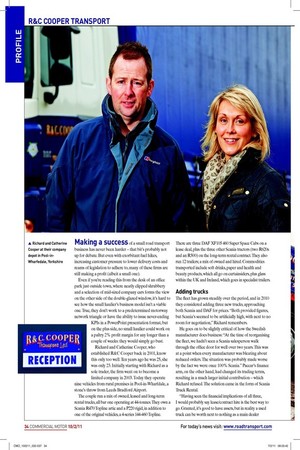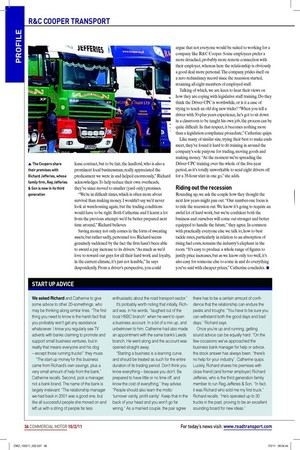Making a success of a small road transport business has
Page 24

Page 25

If you've noticed an error in this article please click here to report it so we can fix it.
never been harder – that bit’s probably not up for debate. But even with exorbitant fuel hikes, increasing customer pressure to lower delivery costs and reams of legislation to adhere to, many of these irms are still making a proit (albeit a small one).
Even if you’re reading this from the desk of an ofice park just outside town, where neatly clipped shrubbery and a selection of mid-sized company cars forms the view on the other side of the double-glazed window, it’s hard to see how the small haulier’s business model isn’t a viable one. True, they don’t work to a predetermined motorway network triangle or have the ability to issue never-ending KPIs in a PowerPoint presentation format, but on the plus side, no small haulier could work on a paltry 2% proit margin for any longer than a couple of weeks: they would simply go bust.
Richard and Catherine Cooper, who established R&C Cooper back in 2001, know this only too well. Ten years ago he was 25, she was only 23. Initially starting with Richard as a sole trader, the irm went on to become a limited company in 2003. Today they operate nine vehicles from rural premises in Pool-in-Wharfdale, a stone’s throw from Leeds Bradford Airport.
The couple run a mix of owned, leased and long-term rental trucks, all bar one operating at 44-tonnes. They own a Scania R470 Topline artic and a P220 rigid, in addition to one of the original vehicles, a 4-series 144-460 Topline. There are three DAF XF105 460 Super Space Cabs on a lease deal, plus the three other Scania tractors (two R620s and an R500) on the long-term rental contract. They also run 12 trailers; a mix of owned and hired. Commodities transported include soft drinks, paper and health and beauty products, which all go on curtainsiders, plus glass within the UK and Ireland, which goes in specialist trailers.
Adding trucks
The leet has grown steadily over the period, and in 2010 they considered adding three new trucks, approaching both Scania and DAF for prices. “Both provided igures, but Scania’s seemed to be artiicially high, with next to no room for negotiation,” Richard remembers.
He goes on to be slightly critical of how the Swedish manufacturer does business: “At the time of reorganising the leet, we hadn’t seen a Scania salesperson walk through the ofice door for well over two years. This was at a point when every manufacturer was bleating about reduced orders. The situation was probably made worse by the fact we were once 100% Scania.” Paccar’s inance arm, on the other hand, had changed its trading terms, resulting in a much larger initial contribution – which Richard refused. The solution came in the form of Scania Truck Rental.
“Having seen the inancial implications of all three, I would probably say lease/contract hire is the best way to go. Granted, it’s good to have assets, but in reality a used truck can be worth next to nothing as a main dealer lease contract, but to be fair, the landlord, who is also a prominent local businessman, really appreciated the predicament we were in and helped enormously,” Richard acknowledges. To help reduce their own overheads, they’ve since moved to smaller (yard only) premises.
“We’re in dificult times, which is often more about survival than making money. I wouldn’t say we’d never look at warehousing again, but the trading conditions would have to be right. Both Catherine and I learnt a lot from the previous attempt: we’d be better prepared next time around,” Richard believes.
Saving money not only comes in the form of sweating assets, but rather sadly, personnel too. Richard seems genuinely saddened by the fact the irm hasn’t been able to award a pay increase to its drivers. “As much as we’d love to reward our guys for all their hard work and loyalty, in the current climate, it’s just not feasible,” he says despondently. From a driver’s perspective, you could argue that not everyone would be suited to working for a company like R&C Cooper. Some employees prefer a more detached, probably more remote connection with their employer, whereas here the relationship is obviously a good deal more personal. The company prides itself on a zero redundancy record since the recession started, retaining all eight members of employed staff.
Talking of which, we are keen to hear their views on how they are coping with legislative staff training. Do they think the Driver CPC is worthwhile, or is it a case of trying to teach an old dog new tricks? “When you tell a driver with 30-plus years experience, he’s got to sit down in a classroom to be taught his own job, the process can be quite dificult. In that respect, it becomes nothing more than a legislation compliance procedure,” Catherine quips.
Like many of similar size, trying their best to make ends meet, they’ve found it hard to it training in around the company’s sole purpose for trading, moving goods and making money. “At the moment we’re spreading the Driver CPC training over the whole of the ive-year period, as it’s totally unworkable to send eight drivers off for a 35-hour stint in one go,” she adds.
Riding out the recession
Rounding up, we ask the couple how they thought the next few years might pan out. “Our number-one focus is to ride the recession out. We know it’s going to require an awful lot of hard work, but we’re conident both the business and ourselves will come out stronger and better equipped to handle the future,” they agree. In common with practically everyone else we talk to, how to best tackle rates, particularly in relation to an absorption of rising fuel costs, remains the industry’s elephant in the room. “It’s easy to produce a whole range of igures to justify price increases, but as we know only too well, it’s also easy for someone else to come in and do everything you’ve said with cheaper prices,” Catherine concludes. ■





































